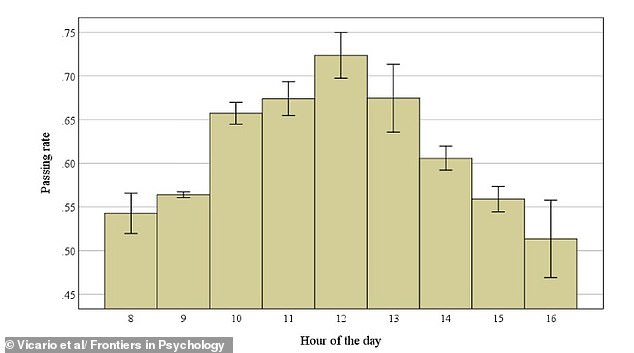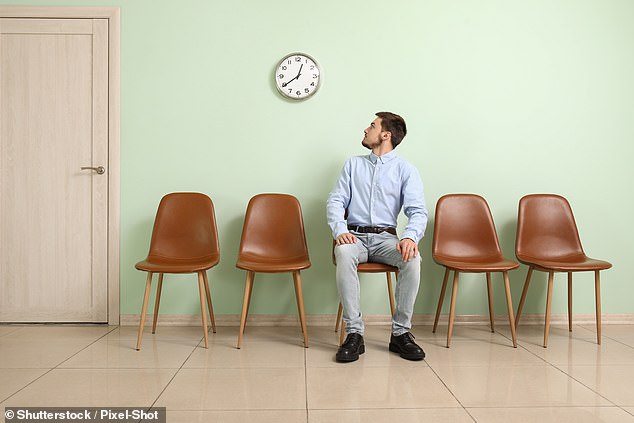When it comes to job interviews, there are endless tips and tricks that promise to help you land the role.
But experts have revealed one of the simplest ways to boost your chances – and it’s all to do with timing.
Researchers investigating oral exams at university discovered that students had the highest level of passing if their exam was held around lunchtime.
In contrast, the chances of passing were lowest at the beginning and end of the day, they found.
Given the similarities between oral exams and job interviews, they believe their findings could be applicable to hiring situations.
‘We show that academic assessment outcomes vary systematically across the day, with a clear peak in passing rates around midday,’ Professor Carmelo Mario Vicario, lead author of the study, said.
‘Students were more likely to pass in late morning compared to early morning or late afternoon.
‘We believe this pattern could extend to job interviews or any evaluative process scheduled throughout the day.’

This table shows how the exam passing rate varies throughout the day, following a bell–shaped curve with a peak at noon

Experts say their findings could be applicable to job interviews – and it could help people boost their chances of landing a role (stock image)
The researchers, from the University of Messina in Italy, were inspired by work which showed that judges were most likely to rule in favour of a defendant after meal breaks or at the beginning of a session.
They collected the date, time and outcome of more than 100,000 assessments delivered by 680 examiners for 1,200 courses.
‘Oral exams in Italian universities are scheduled at set times, typically lasting 10 to 30 minutes per student,’ Professor Vicario said.
‘There’s no standardized format – professors ask questions based on the course content, and grades are assigned on the spot.
‘These exams can be highly stressful due to their unpredictable nature and the strong weight they carry in academic progression.’
Overall, only 57 per cent of the exams were passed, they found, with the passing rate peaking at noon.
There was no significant difference in the chance of passing if the exam was held at 11am or 1pm, but the chances of passing were lower if the exam was at 8am or 9am, or at 3pm or 4pm, they said.
‘These findings have wide–ranging implications,’ co–author Professor Alessio Avenanti of the University of Bologna, said.

Researchers investigating oral exams at university discovered that students had the highest level of passing if their exam was held between 11am and 1pm (stock image)
‘They highlight how biological rhythms — often overlooked in decision–making contexts — can subtly but significantly shape the outcome of high–stakes evaluations.’
Although the study can’t identify the mechanisms behind this pattern, the peak in passes at midday reinforces evidence that cognitive performance improves over the course of a morning before declining in the afternoon.
Students’ falling energy levels could also lead to diminishing focus, compromising their performance, the team said.
‘We would be very interested in investigating whether hiring decisions, too, fluctuate in fairness or outcome depending on time of day,’ Professor Vicario said.
The findings were published in the journal Frontiers in Psychology.
